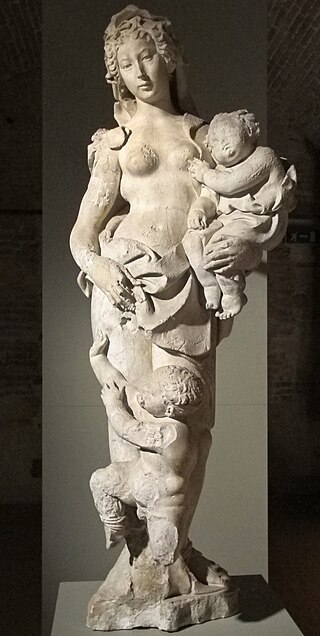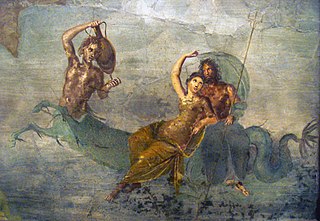
Jupiter, also known as Jove, is the god of the sky and thunder, and king of the gods in ancient Roman religion and mythology. Jupiter was the chief deity of Roman state religion throughout the Republican and Imperial eras, until Christianity became the dominant religion of the Empire. In Roman mythology, he negotiates with Numa Pompilius, the second king of Rome, to establish principles of Roman religion such as offering, or sacrifice.

Aulus Gellius was a Roman author and grammarian, who was probably born and certainly brought up in Rome. He was educated in Athens, after which he returned to Rome. He is famous for his Attic Nights, a commonplace book, or compilation of notes on grammar, philosophy, history, antiquarianism, and other subjects, preserving fragments of the works of many authors who might otherwise be unknown today.

Acca Larentia or Acca Larentina was a mythical woman, later a goddess of fertility, in Roman mythology whose festival, the Larentalia, was celebrated on December 23.

In ancient Roman religion, the di nixi, also Nixae, were birth deities. They were depicted kneeling or squatting, a more common birthing position in antiquity than in the modern era. The 2nd-century grammarian Festus explains their name as the participle of the Latin verb nitor, niti, nixus, "to support oneself," also "strive, labor," in this sense "be in labor, give birth." Varro said that enixae was the term for women in labor brought about by the Nixae, who oversee the types of religious practices that pertain to those giving birth. In some editions of Ovid's Metamorphoses, a phrase is taken as referring to the birth goddess Lucina and her counterpart collective, the Nixi.
In Roman mythology, Postverta or Postvorta was the goddess of the past and one of the two Carmentes. They were companions of the goddess Carmenta, and probably embodied her aspects as the goddess of the past (Postvorta) and the future.

Neptune is the Roman god of freshwater and the sea in Roman religion. He is the counterpart of the Greek god Poseidon. In the Greek-inspired tradition, he is a brother of Jupiter and Pluto; the brothers preside over the realms of heaven, the earthly world, and the seas. Salacia is his wife.
Marcus Terentius Varro was a Roman polymath and a prolific author. He is regarded as ancient Rome's greatest scholar, and was described by Petrarch as "the third great light of Rome". He is sometimes called Varro Reatinus to distinguish him from his younger contemporary Varro Atacinus.
Vatican Hill is a hill located across the Tiber river from the traditional seven hills of Rome, that also gave the name to Vatican City. It is the location of St. Peter's Basilica.
The Robigalia was a festival in ancient Roman religion held April 25, named for the god Robigus. Its main ritual was a dog sacrifice to protect grain fields from disease. Games (ludi) in the form of "major and minor" races were held. The Robigalia was one of several agricultural festivals in April to celebrate and vitalize the growing season, but the darker sacrificial elements of these occasions are also fraught with anxiety about crop failure and the dependence on divine favor to avert it.

In ancient Roman religion and mythology, Tellus Mater or Terra Mater is the personification of the Earth. Although Tellus and Terra are hardly distinguishable during the Imperial era, Tellus was the name of the original earth goddess in the religious practices of the Republic or earlier. The scholar Varro (1st century BC) lists Tellus as one of the di selecti, the twenty principal gods of Rome, and one of the twelve agricultural deities. She is regularly associated with Ceres in rituals pertaining to the earth and agricultural fertility.
In ancient Roman religion, Averruncus or Auruncus is a god of averting harm. Aulus Gellius says that he is one of the potentially malignant deities who must be propitiated for their power to both inflict and withhold disaster from people and the harvests.
Quintus Valerius Soranus was a Latin poet, grammarian, and tribune of the people in the Late Roman Republic. He was executed in 82 BC while Sulla was dictator, ostensibly for violating a religious prohibition against speaking the arcane name of Rome, but more likely for political reasons. The cognomen Soranus is a toponym indicating that he was from Sora.

In ancient Roman mythology, Salacia was the female divinity of the sea, worshipped as the goddess of salt water who presided over the depths of the ocean. Neptune was her consort. That Salacia was the consort of Neptune is implied by Varro, and is positively affirmed by Seneca, Augustine and Servius. She is identified with the Greek goddess Amphitrite, consort of Poseidon.

In ancient Roman religion, a sacellum is a small shrine. The word is a diminutive from sacrum. The numerous sacella of ancient Rome included both shrines maintained on private properties by families, and public shrines. A sacellum might be square or round.

The vocabulary of ancient Roman religion was highly specialized. Its study affords important information about the religion, traditions and beliefs of the ancient Romans. This legacy is conspicuous in European cultural history in its influence on later juridical and religious vocabulary in Europe, particularly of the Christian Church. This glossary provides explanations of concepts as they were expressed in Latin pertaining to religious practices and beliefs, with links to articles on major topics such as priesthoods, forms of divination, and rituals.

In ancient Roman religion, the indigitamenta were lists of deities kept by the College of Pontiffs to assure that the correct divine names were invoked for public prayers. These lists or books probably described the nature of the various deities who might be called on under particular circumstances, with specifics about the sequence of invocation. The earliest indigitamenta, like many other aspects of Roman religion, were attributed to Numa Pompilius, second king of Rome.
The Moles are goddesses who appear in an ancient Roman prayer formula in connection with Mars. The list of invocations given by Aulus Gellius pairs a god's name with a feminine nominative noun that personifies a quality or power of the god (Moles Martis, "Moles of Mars"). These pairings are often taken as "marriages" in the anthropomorphic mythological tradition. An inscription records a supplicatio Molibus Martis, supplication for the Moles of Mars.
The lex Aternia Tarpeia was a Roman law, introduced by the consuls Aulus Aternius Varus and Spurius Tarpeius Montanus Capitolinus in 454 BC, and passed during their year of office. The law concerned the regulation of payments for fines and penalties.








